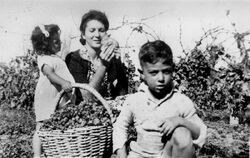| Llywelyn Rhys | |

| |
|---|---|
| Name | Llywelyn Rhys |
| Full name | Llywelyn Morgan Rhys |
| Sex | |
| Born | 5 September, 1895, |
| Deceased | 26 August, 1955, |
| Spouse | Daisy Ulakhova (1899-1969) |
| Children | Oliver Rhys (1923-2007) Michaela (1924) |
| Parents | Dafydd Rhys (1870-1919) Marilyn Browne (1872-1939) |
| Home | |
| Functions | Writer, farmer, soldier |
| Languages | English, Welsh, French |
| Religious stance |
Orthodox Christian |
Llywelyn Morgan Rhys (5 September, 1895 in Noble City - 26 August, 1955 in Charleston) was a Lovian soldier, farmer and writer of Welsh descent. Morgan was one of the three Lovian volunteers who fought in the World War I. The others being Henry Istvan and Andrew Ramsley and thus is regarded as a hero.
Biography[]
Family and early years[]
Llywelyn Morgan Rhys was born on 5 September in 1895 in Noble City; the capital city of Lovia in the State of Sylvania. He was the second of two children born to Dafydd Rhys; an immigrant from Wales, and Marilyn Browne. His father used to work as a docker, while his mother was the daughter of Peter Browne, a grocer. As a teen, Llywelyn worked for a shoemaker and also helped in his grandfather's business.
Llywelyn and his older brother John spent many hours reading historical novels, such as The Three Musketeers and Ivanhoe. He loved Britain's folklore and history, especially that of Scotland and Wales. According to an interview to The Noble City Times in 1919 his father used to narrates stories about the ancient mythology and medieval history of his country.
At war[]
When World War I broke out, Llywelyn wanted to fight for the Triple Entente. King Arthur II though didn't sent any troops, as the population of Lovia was too small. Initially, Llywelyn applied to the British Army, but was rejected. He gave up and continued to live peacefully in Noble City. In 1917 the United States entered the war and so Llywelyn applied again. This time his application was accepted and he was sent to fight in France.
Llywelyn fought in the Battle of Amiens and later in Battle of Saint-Mihiel. In this specific conflict he was wounded in his right hand and was hospitalized for a few weeks. He did not participate in another battle and instead was used as a messenger. His new duty brought him in England where he stayed until the end of the war.
Trip in Wales and homecoming[]

Llywelyn Rhys' family in the garden.
After the war Llywelyn visited his father's village, Aberporth. During his stay there he lived with his uncle Gareth and his family. Llywelyn worked for several months in Aberporth and afterwards he traveled all over Wales. In 1919 he decided to go back to Lovia.
Llywelyn reached Noble City in March and was welcomed as a hero. His deeds were known to everyone and when he was awarded with the Gold Star of the Order of Arthur I, he received mythic status. King Arthur II himself called him an outstanding example of bravery and virtue.
Upon his arrival Llywelyn moved to Novosevensk where he ran a little farm. In 1921 he married Daisy Ulakhova; a local teacher. Two years later Daisy gave birth to their first child Oliver and the very next year a girl was born; Michaela. With help from his brother John, Llywelyn opened a honey shop. It was quite difficult at the beginning but soon he had enough money to develop his business.
Last years and death[]
In 1936, Llywelyn started writing his biography, focusing on his war experience. The book was published in 1939. In 1943, with World War II at its peak, Llywelyn published A Matter of Honour, an anti-war novel.
Llywelyn was diagnosed with Parkinson's disease in 1949 and he retired in 1951 as the symptoms of his disease worsened. He died on 26 August in 1955 from heart attack. He was buried at public expense on the Cemetery of St. Lawrence, Novosevensk.